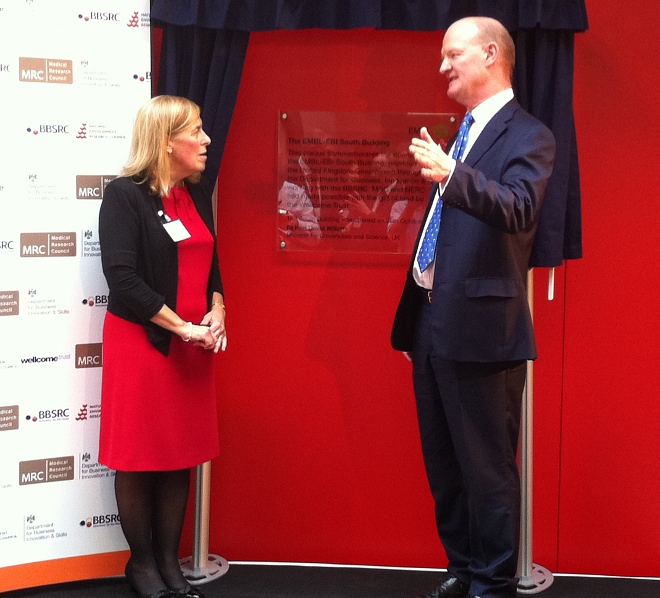New building set to drive translational medicine

Bioinformatics is the application of computer science to biology. This new building – and the funding that makes it possible – represents a growing awareness of the potential benefits to society that bioinformatics can bring, including better medicines, crops resistant to climatic change and the protection of biodiversity. Major support for the new build comes from the Biotechnology and Biological Sciences Research Council (BBSRC), the Medical Research Council (MRC), the Natural Environment Research Council (NERC) and the Wellcome Trust.
“This splendid new building heralds the next phase in bioinformatics at EMBL-EBI, when biodata joins the ranks of Big Data and ELIXIR pioneers a new approach to saving and sharing research data throughout Europe. These data are a goldmine for research, and are driving novel R&D in both academia and the bioindustries.”
Professor Dame Janet Thornton Director of EMBL-EBI
“This new facility is the embodiment of our investment in big data and bioinformatics. We are not only ensuring that people will receive better services and resource security, we are also maintaining UK leadership in the global science race.”
David Willetts Science and Universities Minister
As bioinformatics involves analysing very large volumes of data about living things, it is essential for tackling the serious challenges our society faces, from providing healthcare to an ageing population to securing our food and water resources. The new facilities will enable researchers throughout Europe to remain competitive in this expanding area, and will secure the UK’s position at the forefront of bioinformatics.
The new building will house EMBL-EBI staff; an Industry and Translation suite, offering space for collaboration with industry partners in the spheres of pharma, agribusiness, biotech and consumer goods; and the Directorate and technical staff of the ELIXIR Technical Hub. ELIXIR is a pan European infrastructure for the sharing of biological data, funded through sustainable contributions from national member states and the European Commission.
“At the Sanger Institute, bioinformatics underpins all our research and its translation into human healthcare, and its importance will only grow further as we explore more genomes. This is indeed an important and exciting moment for European bioinformatics generally and will add greatly to the strengths of research carried out here at the Wellcome Trust Genome Campus.”
Professor Sir Mike Stratton Director of the Wellcome Trust Sanger Institute
More information
Selected websites
The European Bioinformatics Institute
The European Bioinformatics Institute (EBI) is part of the European Molecular Biology Laboratory (EMBL) and is located on the Wellcome Trust Genome Campus in Hinxton near Cambridge, UK. The EBI grew out of EMBL’s pioneering work in providing public biological databases to the research community. It hosts some of the world’s most important collections of biological data, including DNA sequences (ENA), protein sequences (UniProt), animal genomes (Ensembl), 3D structures (the Protein Databank in Europe), data from gene expression experiments (ArrayExpress), protein-protein interactions (IntAct) and pathway information (Reactome). EMBL-EBI hosts several research groups and its scientists continually develop new tools for the biocomputing community.
The Wellcome Trust Sanger Institute
The Wellcome Trust Sanger Institute is one of the world’s leading genome centres. Through its ability to conduct research at scale, it is able to engage in bold and long-term exploratory projects that are designed to influence and empower medical science globally. Institute research findings, generated through its own research programmes and through its leading role in international consortia, are being used to develop new diagnostics and treatments for human disease.
The Wellcome Trust
The Wellcome Trust is a global charitable foundation dedicated to achieving extraordinary improvements in human and animal health. We support the brightest minds in biomedical research and the medical humanities. Our breadth of support includes public engagement, education and the application of research to improve health. We are independent of both political and commercial interests.


